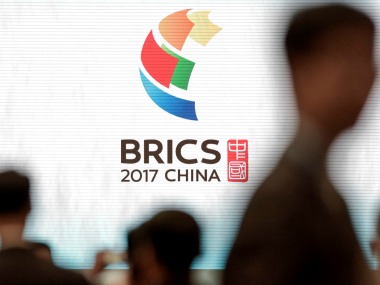In the days leading up to the ninth BRICS Summit, China’s foreign ministry spokesperson
Hua Chunying told journalists at the ministry’s regular press conference, “We have taken note of the concerns of the Indian side on counter-terrorism issues of Pakistan, but I don’t believe that it should feature prominently during the Xiamen Summit.” It was believed by an Indian media, still in the throes of the
'war' rhetoric over Doka La, that this meant China would block India and any mention of terrorism at the summit. Fast-forward a few days to the actual summit and the
BRICS Leaders Xiamen Declaration , to be more precise. The 48th section of the declaration reads: “We, in this regard, express concern on the security situation in the region and violence caused by the Taliban, (Islamic State)/DAISH, Al-Qaeda and its affiliates including Eastern Turkistan Islamic Movement, Islamic Movement of Uzbekistan, the Haqqani network, Lashkar-e-Taiba, Jaish-e-Mohammad, TTP and Hizb ut-Tahrir.” [caption id=“attachment_4006585” align=“alignleft” width=“380”] Representational image. Reuters[/caption] While joint declarations by the grouping have without exception
carried sections condemning terrorism , this was the first time that a handful of terror groups that affect South Asia, like Lashkar-e-Taiba, Jaish-e-Mohammad, the Haqqani Network and Tehrik-i-Taliban Pakistan, found a mention. There will be two schools of thought that will emanate from this: First, there will be those who will be hailing this sentence (Section 48) as a hyper, mega, ultra win for India, for Narendra Modi, for the BJP and so on. Second, there will be those who will say that talk is cheap and remain skeptical of the respective wills of China and Russia (in particular) to assist India in combating terror on the subcontinent. To take a more measured approach, while it would be unrealistic to expect Moscow and Beijing to make terrorism their No. 1 priority and tear into Pakistan with all guns a-blaze, that the declaration actually included the names of two unabashedly anti-India groups demonstrates movement in the right direction. If nothing else, this will at least send a message to the constituents of those groups and the country they call home that, for better or worse, they are on the radar of the grouping. Additionally, that the 43-page declaration contained 32 references to terrorism — slightly down from last year’s 37, but more than all other preceding years — indicates that terrorism occupies a significant share of the mindspace of the five world leaders assembled in Xiamen. In terms of specifics, Russia and South Africa have largely been left untouched by Islamic terror, but have regularly condemned it. Russia too has been largely clear in its condemnation of terror, particularly the sort that affects India.
China has been a bit more reticent about calling out terror for what it is, and for the country, it’s the mention of Jaish-e-Mohammad that could be slightly problematic.
On one hand, naming JeM indicates that Beijing agrees that the group is problematic and that there is a need to tackle it. On the other, the fact that China extended its technical hold on designating Masood Azhar as a terrorist by another three months in August, is indicative of mixed messages. When this latest technical hold expires in November, it will be interesting to see if Beijing chooses to extend said hold and undermine the declaration or opt against doing so, and allow Azhar to be designated a terrorist. Xi Jinping’s decision in this regard will go some way in demonstrating how serious China was about the Xiamen Declaration it just signed.


)




